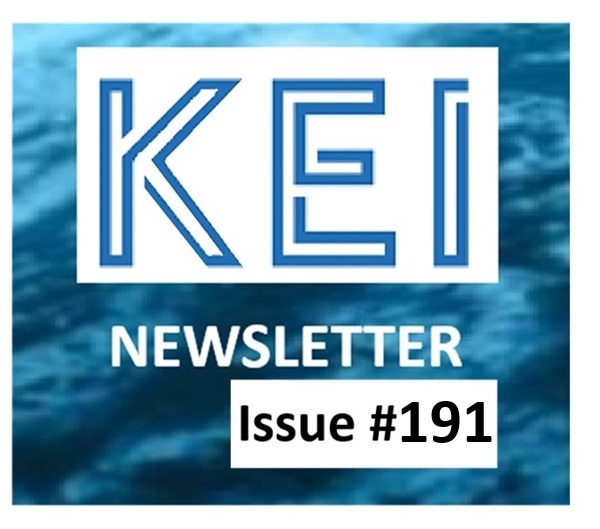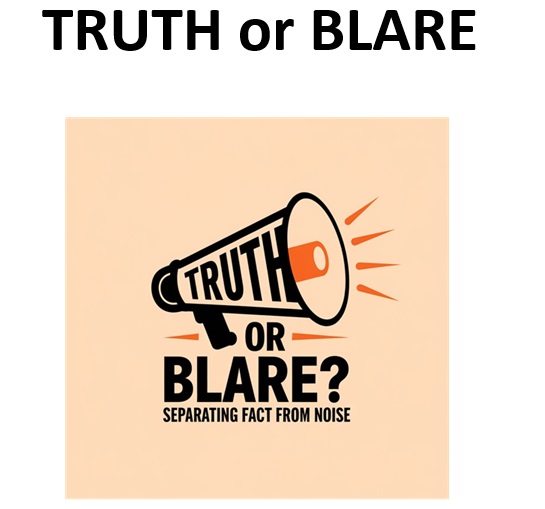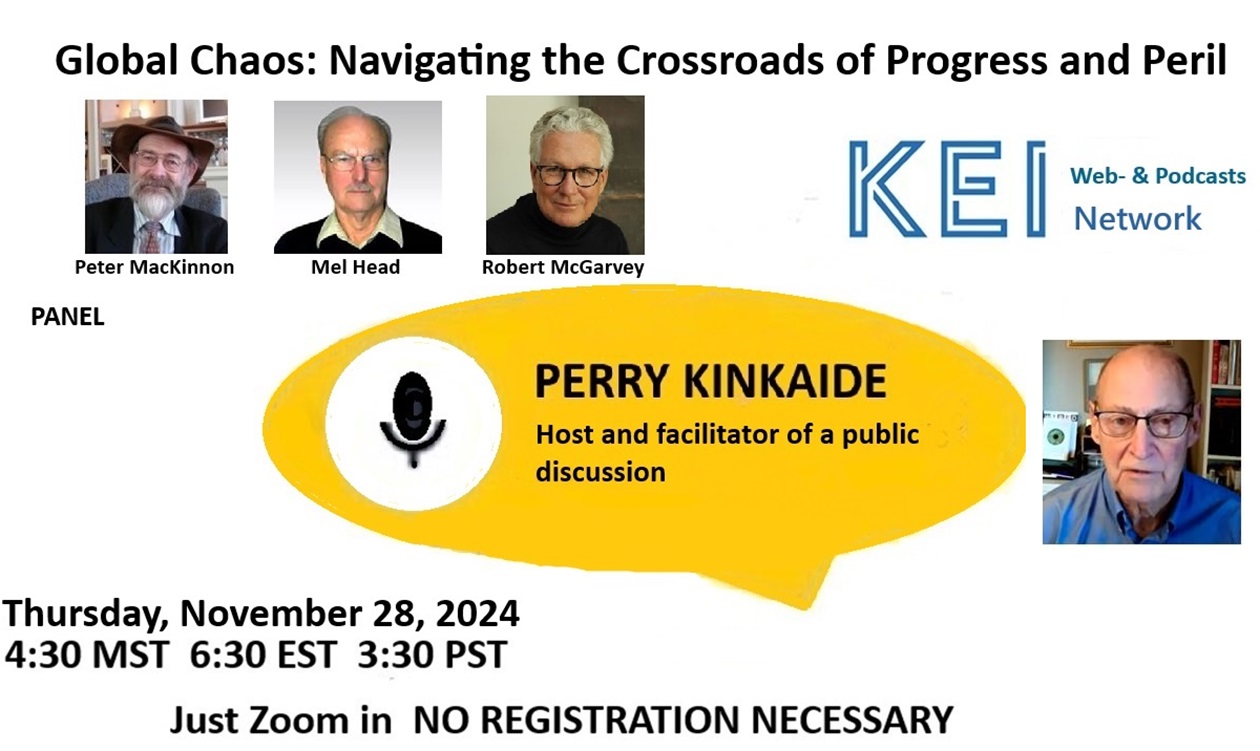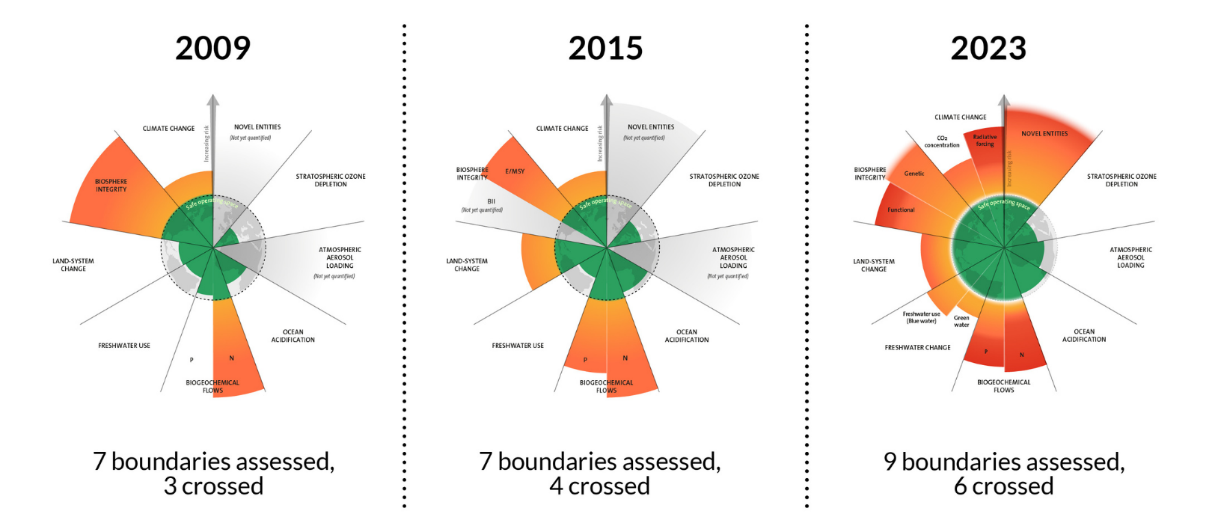We've added a new feature - TRUTH or BLARE, applying critical thinking to a contentious viewpoint and possible source of misinformation. This week: RFK Jr. - Misunderstood ? A vaccine breakthrough in 1954 sparked distrust in some, fueled by misinformation. Today, RFK Jr.'s vaccine pronouncements have made him a polarizing figure. Is he a pblic health menace spreading misinformation? Or just a misunderstood crusader asking uncomfortable questions about transparency and safety? His story demands we challenge assumptions and engage in nuanced discourse on uncomfortable topics. THINK HERE Global Turmoil: OVERVIEW - Navigating the Polycrises of Progress and Peril In an era often defined by unprecedented technological progress and improving living standards, the world finds itself paradoxically in the grip of rising social, economic, political and geopolitical turmoil. This complex web of crises is reshaping societies on a global scale, and in doing so, demanding the need for urgent action as nations and the world face a critical juncture between progress and collapse. We've asked Peter MacKinnon to weigh in with his perspective on what he refers to as a set of simultaneous polycrises. The world is slipping into a two stage inter-related set of polycrises – the first being the multi-dimensional crisis as noted above, be it at the corporate, state, society and even family levels. The second set is human caused degradation of the natural environment at a rate exceeding the carrying capacity of the planet. The combination is creating a toxic mix of indecision, vest interests, political bickering, uncertainty and growing fear worldwide as the clock ticks – having the time to act is critical; that gap is closing at an accelerating rate, with catastrophic consequences if humanity fails to address these challenges in a collective and collaborative way. What follows are Peter MacKinnon's comments on themes featured in the KEI Network's November articles exploring the Global Paradox of increased turmoil at a time of extraordinary progress worldwide.
The Economic TightropeThe global economy stands on the brink – wars, geopolitics, the polycrisis and Trump come to mind, yet at the same time we celebrate extraordinary progress worldwide in education, health and the lifting of millions out of poverty. I advocate that the most imminent threat to Canada and the democratic world is Trump and his shoot-from-the-hip policy approach. For example, in less than 2 months, Trump’s tariff walls will begin to knock global trade off balance leading to the collapse in many global supply chains, chaos in global transportation, higher inflation worldwide, and increased social unrest in America and beyond. War in Europe in the early 21st century seemed preposterous; yet is happening. Chaos in the Middle East continues to increase. Sabre rattling in the Taiwan Straits and South China Sea coupled with military provocations from North Korea grow. Stability is fading as the nexus of global power shifts East – to China, India and beyond. ... Continued below
Geopolitics of nation states are shifting with many bracing for America’s hard turn to the right, so hard it may turn out to be autocratic in nature with a subsequent collapse in the rule of law in America and in international relations. By returning to an isolationist world, Trump seeks to create an American economy walled off from global fair market trade. I believe the consequences of such action will pass the global economic torch to China and lead, over the coming Trump term, to a shift in the global reserve currency and decline in American global trade. The polycrisis, currently comprised of nine interconnected stresses humanity has imposed on the planet (see diagram below), is gathering steam and is likely to worsen as America abandons international agreements such as the Paris Climate Accord, membership in the World Health Organization, and abandoning free trade and arms agreements in remaking America for Americans only.
Source: https://www.stockholmresilience.org/research/planetary-boundaries.html This will lead to a shrinking of global trade, a continuing slow down in birth rates, fewer jobs and more disruption. And then there is the prospect of technology disruptions brought on by artificial intelligence and other forms of disruptive technologies, including synthetic biology. The Human Cost: Homelessness and Mental Health CrisesHousing faces an endemic shortage in many parts of the world, including in countries like Canada. The influx of legal immigrants has stressed the housing problem and the near-term looks set to generate untold numbers of illegal migrants pouring into Canada from south of the border due to Trump’s efforts to remove millions of undocumented immigrants from the United States on a scale even larger than the Nazi’s efforts to eliminate undesirables in WWII. In recent years with pandemic lockdowns, subsequent job loss/displacement and remote work have led to a massive increase in loneliness at work and at home. The cure is not clear as more young and old people throughout the world are cocooning themselves from contact with others, with many becoming attached to avatars as digital friends. This phenomenon appears to be rooted in a growing fear of the future, a growing lack of confidence in ones’ self and an increasing sense of despair. The emerging result is increasing cases of substance abuse, growing distrust of institutions and collapse in community civics. Collectively, the stresses of contemporary life are taking a toll on overall productivity and on individuals, families and communities as reflected in dramatic increases in mental health problems worldwide. I agree that “these challenges are a direct consequence of broader economic instability, and the failure to address them will have lasting social and economic repercussions. Vulnerable populations, left without a safety net, become trapped in cycles of poverty and disenfranchisement, weakening the fabric of societies.” Climate Change: The Great DestabilizerClimate change is the lighting rod in the polycrisis of environmental disruption, primarily driven by a combination of human disregard for the environment and a consequence of the wastes produced by the unsustainable business model of the global economy, which is based on insatiable consumption of stuff, regardless of its intrinsic value, such as ‘fast moving consumer products’. One of the biggest challenges arising from coping with climate change is how to address mass migrations of people forced to move due to environmental degradation, loss of economic opportunity, and ensuing political and social unrest. “For example, Europe and North America are already grappling with waves of climate refugees, with a number of other countries facing a collapse of governance and public safety”. Despite efforts like the Paris Accord, the world continues to struggle to reconcile economic growth with environmental sustainability, a failure that threatens to destabilize regions around the world leading to famine, civil strife, regional wars, continued deterioration of the environment. It is also likely to create a bifurcation of wealth in the world with the rich getting richer and all the rest falling short with the middleclass getting poorer and the poor becoming destitute. Demographic Shifts and Urban ChallengesDemographic shifts add another layer of complexity to the polycrisis. “In nations like Japan and China, collapsing fertility rates and aging populations are placing immense strain on healthcare systems and pension funds, while depopulation poses longer-term risks to economic vitality. Conversely, developing nations face burgeoning youth populations, struggling with high unemployment and limited economic opportunities; thus, driving frustration and social unrest.” “Migration, both environmental and economic, is exacerbating tensions worldwide. For example, the U.S. southern border has become a flashpoint as waves of migrants from Central America—fleeing consequences of climate change, violence, corruption, and economic collapse.” Urbanization is an accelerating form of human migration. Depopulation of the countryside has been unabated worldwide for decades, only with a slowdown during the recent pandemic. Cites are only getting bigger and some smarter; but on the whole, most cities in the developing world are lacking infrastructure to handle their current residence let alone an influx of climate refugees. Even Canada, noted throughout the world as immigration friendly, has reduced its annual intake of immigrants. This will become a monumental crisis when waves of people are on the move and are turned back by destination countries. Human trafficking, bribery and other forms of maleficence will only proliferate. The Crisis of Governance: The Tyranny Threat“Trust in democratic institutions is in decline, with political polarization deepening the crisis.” Many governments are struggling to contain rising discontent within their societies, and populist movements are gaining traction among democracies. For example, the U.S. faces the alarming possibility of its recently elected leader with authoritarian tendencies, becoming a tyrant who is likely to dismantle democratic norms in favor of unchecked power”. This may well be a existential risk to the post WWII global order, where America falls and its principal enemies rise, making for enhanced conflict on the geopolitical stage. “The erosion of trust is exacerbated by using advanced technologies in disinformation campaigns, often driven by both state and non-state actors. These campaigns, amplified by social media, continue to destabilize democracies around the world, as seen during the global pandemic and the U.S. election cycle. If a tyrant were to rise in the U.S.,” which appears possible, “it could embolden authoritarian regimes globally, further undermining international stability.” “International bodies like the United Nations and the World Trade Organization are struggling to respond to these cascading crises, hampered by nationalistic agendas and weakening global cooperation. Corruption is rampant, particularly where fragile governance structures are already crumbling under the weight of economic and social pressures”. I agree. Geopolitical Tensions and Global ConflictGiven the above, geopolitical tensions are on the rise and driven by both a failure in diplomacy and the waste materials and pollution from an unsustainable business model based on continuous growth and consumption (BAU – Business as Usual). At the same time, geopolitical tensions are being fueled by governments investing vast sums of money into dual use/disruptive technologies such as AI, while at the same time operating in a world without AI rules, only voluntary guardrails. Major geopolitical tensions are emerging in the use of advanced information and communications technologies, notably artificial intelligence. Misinformation, disinformation and election interference are among the areas of applying AI for underhanded purposes. The trend is that it will only get more realistic and more common. At an extreme, AI misuse could lead to raising the potential for global conflict. Technology: Double-Edged SwordsThere are two swords in this duel. In the past 30 years the leading edge of innovation has followed a path defined by bits rather than atoms. In other words, a shift from making things out of atoms, to making frictionless, massless software, easily replicated and globally accessible at scale. At the same time, software, such as AI Agents and Large Language Models, have dual use. Thus, these two themes are interacting as if they are ‘double-edged swords’. The promise of the future is that their use is applied to beneficial ends at scale as opposed to nefarious uses easily executed across the internet from anywhere in the world. With such technology in the ‘wild’ it is now virtually impossible to stop its weaponization and to control its spread and use. The net result is that weaponized AI can be beneficial to bad actors such as autocrats, fraudsters, lone wolfs and all kinds of criminals. In a world with virtually no regulation yet in place and the prospect of the Trump Administration scrapping all AI guardrails and related efforts to implement regulations makes a bleak case for constraining the nefarious uses of AI. The Path ForwardIs there a manageable path forward? It depends. Globally coordinated action is a fragile undertaking as a disruptive Trump resumes control of America, control he may not give up easily, especially starting with his Day One threat of claiming himself as Dictator. As the world grapples with this convergence of crises—economic, environmental, demographic, governance and political—the need for coordinated action is urgent. However, the will to exercise coordination appears to be weakening as regional blocks realign (e.g., growth of the BRICS group). “The inter-connectedness of these challenges demands unprecedented levels of international cooperation and innovation. The global community stands at a critical crossroads. The choices made now will determine whether we plunge further into chaos or manage to harness the forces of progress to build a more stable and equitable world.” to which I agree. We, as individuals and as citizens of an interconnected world, are being challenged to find peace, civility, and, as some might say, joy and happiness. Is this possible under the current dual-pronged global polycrisis? Trends seem negative as almost all threats are increasing. The stakes have never been higher in terms of a driving force in the hands of anyone that could fundamentally disrupt global society as we know it. Moreover, the need for action is as critical as controlling nuclear weapons and relate proliferation. Canada must recognize this chain of crisis as an opportunity for transformative change—on personal, institutional and international levels. The time to act is now, before the world slips irreversibly into the chasm of chaos. |
|||||||||




